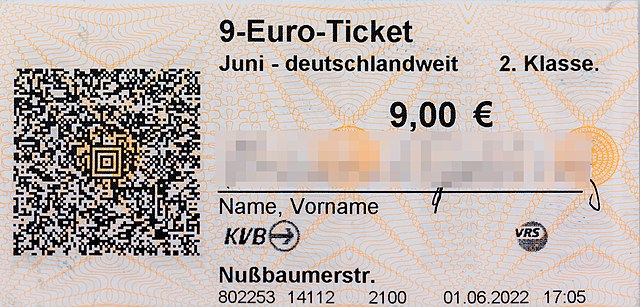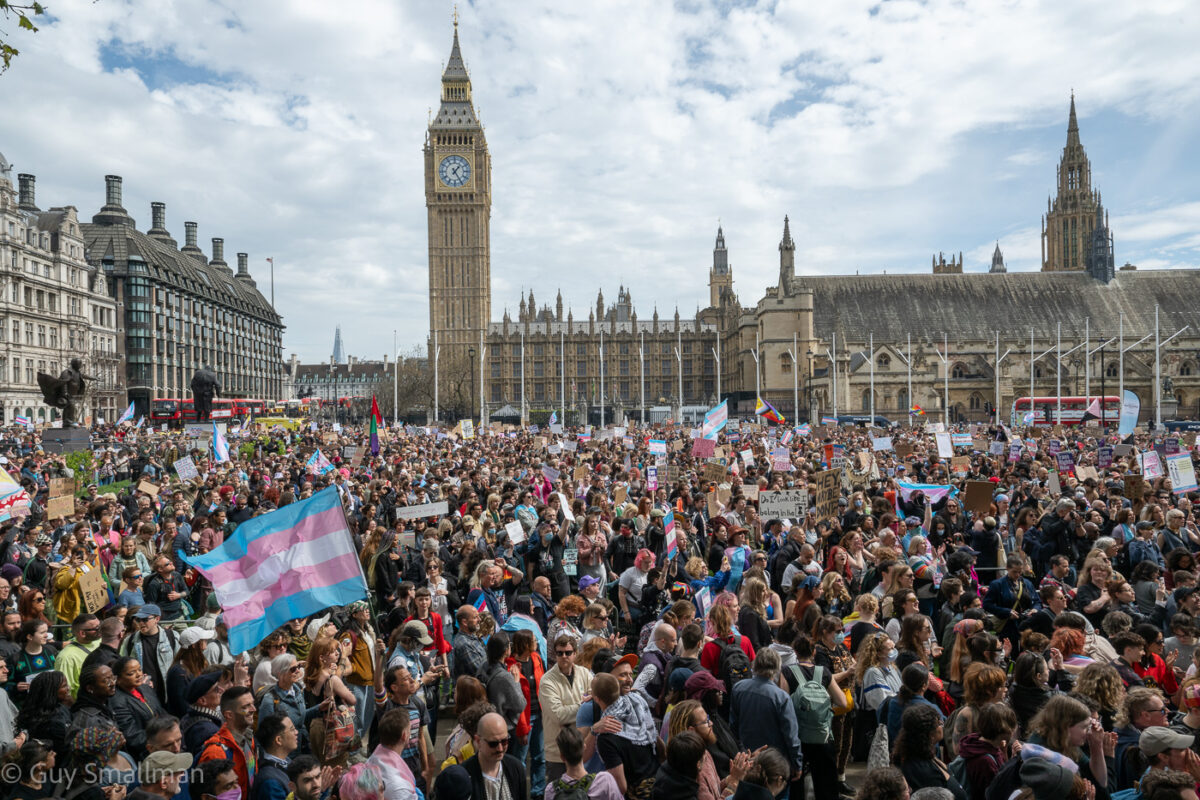If you’re on English-speaking social media, you probably know the meme. It had a large picture of an ICE train and says “Germany is slashing public transit fares by 90% to encourage people to ditch their cars and save energy amid high gas prices.” It was very compelling. Even Tariq Ali shared it. It was also complete bullshit.
Here’s what really happened. In September 2021, Germany voted in a “traffic light” (SPD-Green-Liberal) coalition. This coalition became very unpopular very quickly, not least because one of its first acts was to double the military budget. Inflation was also rising to worrying levels, and Russia’s war with Ukraine had led to an increase in petrol prices.
This is not what is supposed to happen to new governments, which often start with a few reforms before disappointing their voters after a couple of years. The German government needed a populist policy. Enter the €9 ticket.
For three months, from June till August, people in Germany could buy a one-off travel ticket for €9, which entitled them to free transport throughout the country. It wasn’t eligible for all transport – the rich were still able to travel on their ICE and IC trains without being bothered by plebs who could not afford the posh trains. But it was still a real benefit for those of us for whom rail travel was becoming prohibitively expensive.
Writing in the Guardian in July, Melissa and Chris Bruntlett called the introduction of the €9 ticket a “bold and decisive” response to the Covid pandemic and climate change. They went on to argue that “after just one month, the success of the scheme appears to make a compelling case for other countries to follow suit.”
In this article, I want to argue two main points. Firstly, the €9 ticket has been a huge benefit, if not to the environment, then at least to transport users. If introduced properly, it could make a significant contribution to the reduction of car travel, and the pollution that comes with it. And yet, the ticket was never intended to bring long term change, and therefore we must demand much more than what is currently on offer.
What benefits did the €9 ticket bring?
I believe that the €9 ticket was issued in bad faith, and was not a serious attempt to deal with the catastrophic threat to the environment. Nonetheless, it has brought real changes, at the very least in the short term. In just the first month of June, over 30 million tickets were sold. Car usage in city centres dropped dramatically, leading to fewer traffic jams. 23 of 26 examined cities reported a decrease in congestion – up to 14% in cities like Hamburg and Wiesbaden.
The number of flights taken inside Germany sank by 31% compared to pre-pandemic levels. Researchers at the University of Potsdam recorded a 6% to 7% decrease in air pollution levels across Germany. In a poll by Civey, 55% of those asked called for the ticket to be continued. Only 34% were against.
And yet, all of these benefits are likely to disappear in September, when the ticket runs out and travellers return to their cars.
Not just environmental benefits
In its application as a temporary measure, the €9 ticket’s effectiveness in protecting the environment was only ever going to be limited. But, it was still of great benefit to the poor – people who usually can’t afford to leave the city by car or train. As such, it played a small part in redistributing wealth towards those who need the money the most.
Don’t believe the moaners in Ex-Pat chat groups (most of whom never use the cheap trains anyway). When they talk of overcrowded trains and people sitting in the aisles, they’re not entirely wrong, but even on the busiest Saturday, the conditions in German trains have been considerably better than those I’ve experienced on an average day travelling in the UK.
Besides which, to complain that too many people are using trains is a little perverse. This is something which can be solved with a little extra investment – by scheduling more trains, or adding extra carriages. Such investment could also be used to guarantee rail workers a decent wage, and to overcome reservations of the trade unions to fully support the ticket.
Even under the current limitations, the €9 ticket has enabled people in Germany to do all sorts of things that they previously couldn’t afford. The LINKE Berlin Internationals, a group of non-German Berlin activists, of which I am the speaker, organised a series of five separate day trips to visit parts of Germany which many people have not seen before.
In June, July and August, we visited Eisenhüttenstadt, the DDR’s first planned city, Dessau, home of the Bauhaus art movement, the Brecht-Weigel Haus in Buckow, the DDR art archive in Beeskow, and the former concentration camp in Sachsenhausen. These trips provided the ability not just to expand our experiences, but also to discuss important parts of Germany’s political and cultural history.
There were more fundamental savings. To travel around in Berlin, you need a Monatskarte, a monthly travel pass. A Monatskarte currently costs between €86 and €107. And yet in June, July and August, you could travel within Berlin for just €9 for the whole month. On top of this, you could travel outside the city boundaries whenever you want, a benefit not contained in the Monatskarte.
What the €9 ticket did not change
Today, 31st August, 2022, is the last day for which the tickets are valid. After that, we are going back to the old prices for rail travel. There are even reports that tickets will cost more than before.
This means that suggestions that the tickets would encourage car drivers to start using public transport are largely fanciful. You don’t sell your car if you know that in 3 months’ time, train tickets will cost more than ever. What is required is a well-funded public transport system, and increased investment, with the full cooperation of affected trade unions.
This investment is just not happening in Germany. In Berlin, the transport minister Regine Günther (Green Party) has been trying to privatise the S-Bahn (local train line). This would mean diverting money that could be used to make the transport system cheaper and more environmentally friendly into the pockets of shareholders.
In recent months, rail workers in Hessen have organised 5 warning strikes demanding more pay, fair conditions of employment, and that their demands be taken seriously. Other trade unions have been reluctant to support the €9 tickets, reporting that “elevators are broken, toilets on trains no longer work, everything is simply put under a lot of strain.” Claus Weselsky from the GdL union blamed this on “years of broken savings.”
As long ago as 2019, Politico reported that “Germany’s railways are creaking from years of underinvestment.” The article quotes Markus Sievers from Allianz Pro Schiene (alliance for rail) as saying that “Germany even lags behind Italy on investment per head”. In 2017, €66 per German citizen was invested in track infrastructure, compared to €165 in Britain, €128 in the Netherlands and €362 in Switzerland.
Complaints made about the €9 ticket were really about more systemic problems in the under-financed German transport system. We need a fundamental increase in the level of government investment. This requires working with trade unions, not using benefits for passengers to attack pay and working conditions. We also need more public transport in rural areas, where people were least likely to buy the €9 ticket.
What are the demands?
The €9 ticket was seriously popular, so naturally campaigns for its retention have sprung up. The civil movement campact has launched the campaign 9-Euro-Ticket retten! (save the €9 ticket) with the following demands:
-
Extend the €9 ticket until the end of the year and provide a permanent solution: a climate ticket which costs a maximum of €1 per day.
-
Invest in the expansion of the rail and regional transport offers, particularly in the countryside, so that public transport will be more attractive.
-
Finance this by reducing subsidies which damage the climate, such as tax advantages for company cars.
Similarly, a petition launched by the broad-based campaign 9 Euro Ticket weiterfahren (continue with the €9 ticket) has already received 14,000 signatories. This petition makes the following demands:
-
We want to permanently retain the €9 ticket, for public transport in the whole country.
-
We want the government to massively invest in bus and rail, and in more workers with good conditions.
-
We want to restructure the budget: finance mobility for all, instead of encouraging car traffic.
The campaign says the following: “the €9 Ticket costs €12 billion a year. The environmentally harmful subsidies and tax concessions from the Federal government amount to €65 billion every year. Both inexpensive tickets and the expansion of buses and trains are financeable, if the political will is there.”
Build political power
Germany’s neoliberal finance minister Christian Lindner has refused to consider continuing the ticket, arguing that it is “not fair”. Lindner also suggested that the €9 ticket was suspect because it was “supported by Antifa”. Although Chancellor Olaf Scholz has called the €9 ticket a “great success”, Lindner is an important coalition partner for him. The pressure for change must come from outside parliament.
The rail strikes in Britain have shown that the fight for public transport can inspire public support. 58% of Britons say that rail strikes are justified. Even the Church Times is reporting that rail union leader Mick Lynch is “suddenly popular”, while over half of people polled consistently believe that Labour leader Keir Starmer is doing badly in his job. A campaign for the €9 ticket which involves rail unions could be both popular and effective.
In a recent paper for the rosa luxemburg stiftung, Mario Candeias argued: “an expansion of public transport would ensure more social justice because it is precisely the poorer sections of the population that are most dependent on public transport, as they cannot afford cars.” An extension of the €9 ticket, combined with increased investment in transport infrastructure would benefit both the environment and the everyday lives of people who are not super-rich.
What now?
Despite all of this, there is still no offer of extending the ticket. There are rumours of some variation of an extension, from a €365 yearly ticket to a €69 monthly ticket, both significantly more expensive than what has been on offer for the last 3 months.
In Berlin, there has been speculation of even more on a local level. SPD mayor Franziska Giffey is considering continuing the ticket within Berlin’s AB zones, although she has not committed herself to a price. DGB (trade union confederation) leader Katja Karger has gone further, suggesting a ticket which covers both Berlin and Brandenburg. But still nothing concrete is on the table.
How likely is a solution? On the national level, things don’t look hopeful. The SPD and Greens are happy to claim credit for the scheme while blaming the FDP for Lindner’s opposition. That way they gain the political benefits without having to pay anything.
On a local level, the chance of change is higher. Giffey recently experienced a turbulent party conference, where she was re-elected as SPD leader, but only with 59% of the vote, despite there being no challenger. This is an incredibly low vote, and she needs to offer something to restore her popularity. Together with growing discontent, and talk of a “hot Autumn” of protests, she may just be forced to deliver.



